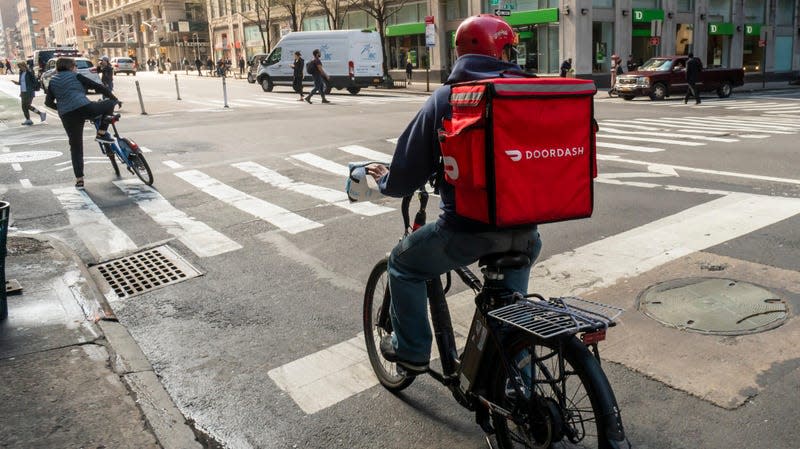DoorDash Says Delivery Workers Can Now Block Problem Customers and Cancel Rude Peoples' Orders

DoorDash, the online food ordering courier, announced a suite of worker-safety-focused features on Monday. The changes include a new ability for delivery workers to block customers who make them feel unsafe, cancel an order if a customer is rude in a text or call, plus other shifts to the DoorDash app, as the company outlined in a blog post.
“We’re clear-eyed about safety and recognize there will always be more work to be done to help make dashing as safe as possible,” wrote the platform in its announcement. “That’s why our teams are constantly working on new technology and safety features to help Dashers stay safe before, during, and after every dash.”
Read more
Most of the new safety features are rolling out initially in the U.S., Canada, Australia, and New Zealand. For one, the company’s couriers in those four countries, called “Dashers,” can now report safety incidents via in-app chat or calls more quickly. After reporting an incident or customer, the delivery service said that workers will be able to block future deliveries to that customer.
DoorDash’s new safety reporting feature will theoretically make it easier for workers to get support more quickly, when feeling unsafe.
Further, the delivery service is introducing a chat feature that auto-detects potentially inappropriate messages sent between couriers and customers. If a Dasher receives a message interpreted as threatening or offensive by the AI, they will have the option to immediately cancel that order.
Check-ins will happen automatically if a delivery is taking longer than expected.
DoorDash also said it is piloting real-time safety alerts through samdesk. In the event of emergencies like bomb threats and building fires, the company said it will contact its couriers, and begin automatically cancelling orders to the impacted areas—notifying both the customer and Dasher. And DoorDash will start sending reminder notifications to encourage customers to turn on exterior lights to aid Dashers.
Finally, the company said it’s instituting automatic check-in messages if a delivery is “taking longer than expected.” Couriers will be prompted to select “I’m okay” or “I feel unsafe” within a 2-minute time window, if they don’t complete an order within the expected time. If they do not respond before the clock runs out, DoorDash workers will receive a phone call from an ADT security agent. Unlike the other changes, check-ins are set to begin with a smaller launch in New York City and Washington, D.C. before a broader, U.S. rollout.
Delivery work can be a dangerous job. There have been a few instances of widely-publicized, violent attacks against couriers. And its not the first time the company has tried to address the problem through app-adjustments. In 2021, DoorDash first introduced an emergency-assistance button for Dashers.
However, as useful as some of these new features may be in certain contexts, they fail to address one of the largest safety issues faced by couriers at DoorDash and beyond. Namely: vehicle accidents and getting hit by cars. Surge pricing incentivizes delivery workers to go out during inclement weather, which can up the risk of crashes. Speed is emphasized above all else. And couriers that use bikes and scooters to navigate dense, urban places like New York City risk serious injury and death among infrastructure designed to accommodate cars first.
Plus, even when delivery workers do report crimes—to the companies they labor for or to law enforcement—they are often effectively ignored.
A big part of what makes delivery so dangerous comes down to the business model. Most couriers are considered contract workers, not employees. Without basic protections like pay guarantees, shift length limits, and insurance benefits—they are left vulnerable. Last year, New York City passed some of the first legislation setting standards for the delivery industry. Yet so far, similar policies haven’t spread nationwide.
Gizmodo reached out to DoorDash for more details on the coming changes and for any available data on worker safety—for instance the comparative rate of injury from accidents vs. violent customers—but the company did not immediately respond.
More from Gizmodo
The Best Shortcuts On Mac: Snap Windows, Text to Speech, and More
How to Delete Your Twitter Account If Elon Musk Was Your Last Straw
Sign up for Gizmodo's Newsletter. For the latest news, Facebook, Twitter and Instagram.

